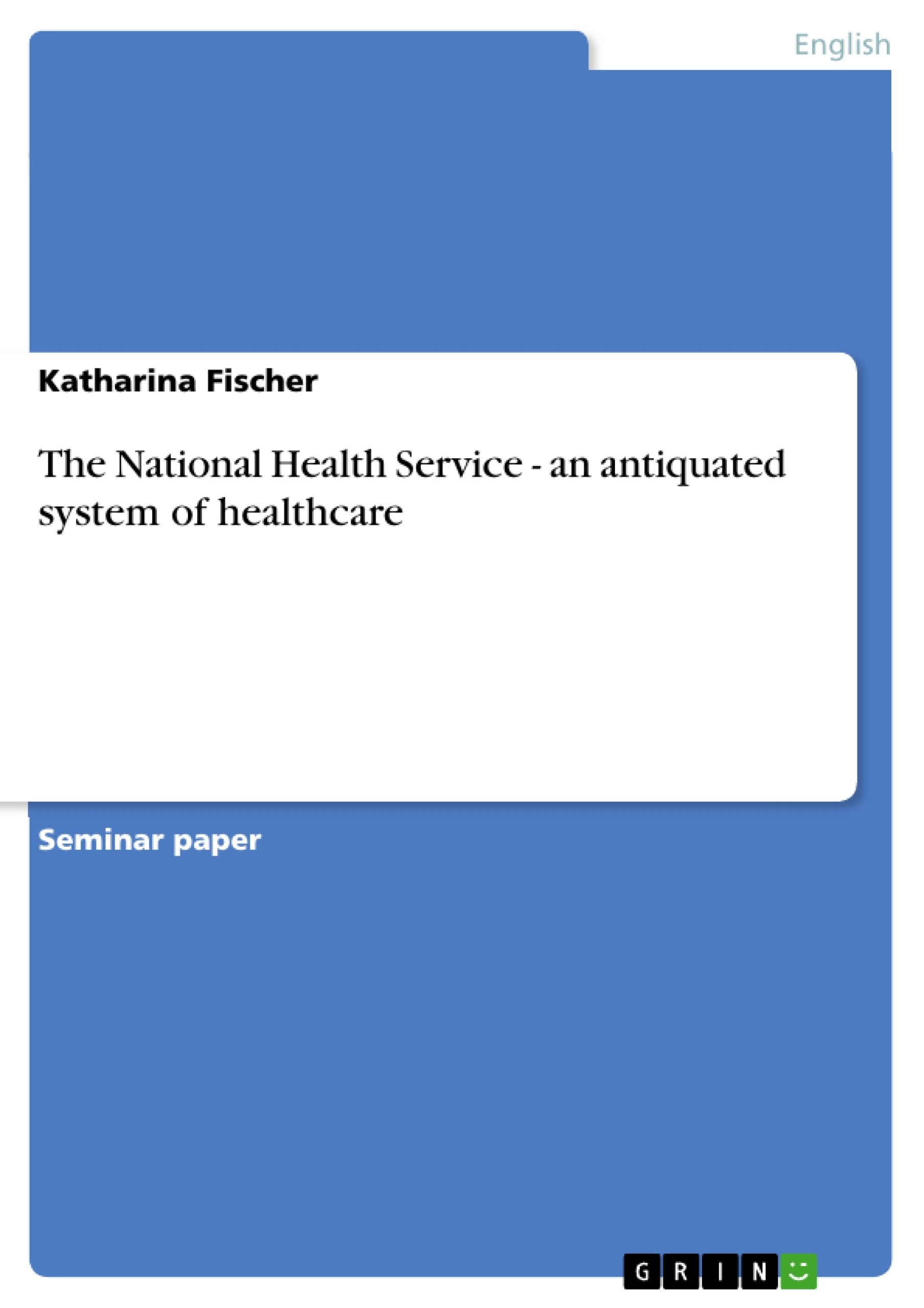At the turn of the 21st century the British system of health care is to be found in serious difficulties. Expenditure constantly grows and the medical services are not able to meet the needs of the population. Patients have to set their names on waiting lists for hospital treatments, staff is underpaid and the top-down structure of the system antiquated and inefficient. In fact, we are facing three major problems: Funding, social change and structure. Funding is almost entirely based on a tax model, combined with a certain demographic model. However during the past fifty years the population has changed, which led to a budget deficit and a dramatically worsening of the services. If there has been a high unemployment, the governmental tax income decreased. On the one hand, life expectancy increases and therefore the demand for medical support. On the other hand, the state is confronted with a declining birth-rate. Children represent the next generation of tax-payers and so the governmental tax income will decrease and the gap between financial resources and expenditure enlarges. The NHS was once founded after the Second World War as an institution of social security and justice to provide free health care for all. In former times, concerning medical supply, people were dependent on themselves, respectively on their financial status. The new model promised to be an advancement. Now the NHS is about to regress. Today, costs for certain medical services are transferred from state to citizens. The system is antiquated, a more flexible model is needed here, which resists major social changes and financial fluctuations. This implies a completely different model of funding and a structural modernisation. A general private insurance is only one alternative. An other opportunity would be the privatisation of the administrative and clinical sector.
Inhaltsverzeichnis (Table of Contents)
- I1. Introduction
- 2. The British System of Health Care
- 2.1 Health care as part of the welfare state
- 2.2 Funding and Expenditure
- 2.3 Structure…..\n
- 3. The National Health Service (NHS) in an existential crisis
- 3.1 Social change
- 3.2 Antiquated funding and structure
- 4. Reforms and perspectives for the future.
- 5. Bibliography
Zielsetzung und Themenschwerpunkte (Objectives and Key Themes)
This paper examines the challenges faced by the British National Health Service (NHS) at the turn of the 21st century. It explores the increasing expenditure, the inability of the medical services to meet the needs of the population, and the difficulties associated with waiting lists, staff underpayment, and the system's antiquated and inefficient structure.
- Funding model and its limitations
- Social change and its impact on healthcare demand
- The antiquated structure of the NHS
- The need for reform and modernisation
- Alternative models of funding and organisation
Zusammenfassung der Kapitel (Chapter Summaries)
The first chapter provides an introduction to the challenges facing the British healthcare system, highlighting the growing expenditure, unmet needs, and the need for reform. Chapter 2 delves into the origins and evolution of the National Health Service (NHS) as part of the welfare state, exploring its objectives, funding mechanisms, and expenditure patterns. This chapter also analyzes the impact of demographic changes on the NHS budget.
Schlüsselwörter (Keywords)
The paper focuses on the British National Health Service (NHS), its funding and expenditure, social change, structural challenges, and the need for reforms. Key concepts include welfare state, public healthcare, taxation, demographic change, and alternative models of healthcare delivery.
Frequently Asked Questions
What are the major problems facing the NHS today?
The NHS faces three main challenges: inadequate funding, social/demographic change, and an antiquated, inefficient top-down structure.
How is the NHS funded?
The NHS is primarily funded through a tax-based model, which becomes problematic when unemployment rises or the ratio of taxpayers to beneficiaries shifts.
How does demographic change impact the British healthcare system?
Increasing life expectancy raises demand for medical support, while a declining birth rate reduces the future generation of taxpayers, widening the budget gap.
Why is the NHS structure considered "antiquated"?
The centralized, bureaucratic structure is seen as inflexible and unable to respond quickly to modern healthcare needs and financial fluctuations.
What are potential alternatives for NHS reform?
Proposed reforms include shifting to a private insurance model or privatizing the administrative and clinical sectors to increase efficiency.
What was the original goal of the NHS?
Founded after WWII, its goal was to provide social security and justice by offering free healthcare for all, regardless of financial status.
- Arbeit zitieren
- Katharina Fischer (Autor:in), 2005, The National Health Service - an antiquated system of healthcare, München, GRIN Verlag, https://www.grin.com/document/51653



